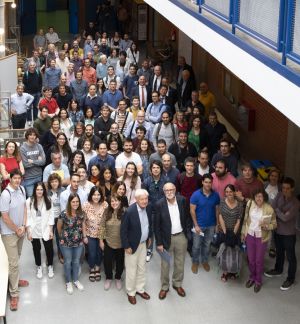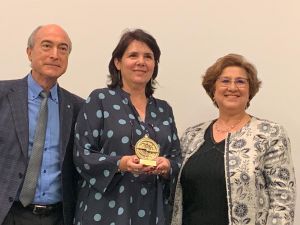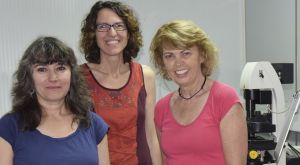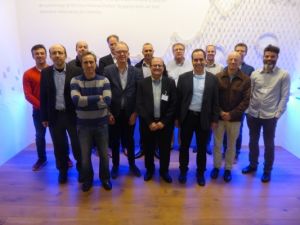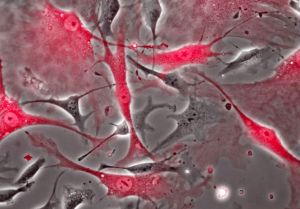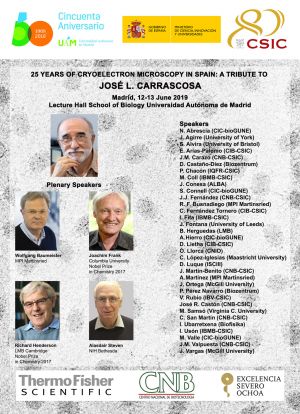- El Centro Nacional de Biotecnología (CSIC) y la Universidad Autónoma de Madrid organizan este simposio los días 12 y 13 de junio
- Una treintena de prestigiosos expertos repasan el estado actual de la criomicroscopía electrónica a través de su experiencia investigadora y la aplicación de la técnica en diferentes campos
Los días 12 y 13 de junio se celebra el simposio 25 años de criomicroscopía electrónica en España. Un homenaje a José L. Carrascosa en el campus de la Universidad Autónoma de Madrid (UAM). Este simposio, enmarcado en la celebración del 50 Aniversario de la UAM, ha sido inaugurado por la presidenta del Consejo Superior de Investigaciones Científicas (CSIC), Rosa Menéndez, y por el rector de la UAM, Rafael Garesse.
Carmen Simón, researcher from the Molecualr Plant Genetics Department and director in the CSIC postgraduate Department has received the Prize for Science Dissemination awarded by the Spanish Confederation of Scientific Societies (COSCE) as a recognition of her efforts in science promotion.
The Prize committee remarked her frequent media appearances, books editions and the organisation of public engagement activities for children through the Association "Apadrina la Ciencia", where she is the current president and a founder member.
In addition, the jury highlighted her active search for contributions from individual donors, foundations and companies, which has allowed to promote doctoral theses awards, grants for emerging researchers and one-year contracts for junior researchers to complete doctoral thesis. As an example of her solidarity principles, Carmen Simón has donated the Prize compensation to Apadrina la Ciencia to generate young researchers contracts..
- The purpose of this collaboration is the fulfillment of industrial-scientific collaborations in new developments in Imaging Microscopy technology.
- This industrial-scientific partnership between CNB-CSIC and Leica Microsystems will foster the development of both parties and bring excellence to the joint endeavor.
Thanks to this agreement, the CNB Advanced Light Microscopy facility will continue to provide high-end imaging technology, tailored trainings, users´ support and fulfill best practice requirements, further evolving into the high-quality standard of worldwide recognised biological imaging centers.
This close cooperation will enable CNB and its scientific partners to learn about state-of the-art technologies in advance, whilst industry will benefit from the constant feedback experience by scientific users.
The unparalleled support of Leica Microsystems will contribute to develop a center of excellence within the Advanced Light Microscopy facility at CNB.
Fernando Almazan, researcher at CNB participates in the project COSMIC that has been awarded 3.5 Million Euro to develop systems to detect CBRNE threats in containers.
Read the full press release here
Regeneration of cardiac cells in the adult is very limited, and cardiomyocyte renewal rate is limited to around 1% per year. In other tissues, the location of stem cells reservoirs is known, but there is no consensus of where they are located in the heart after tissue damage.
Now, the data published in Redox Biology by Antonio Bernad's group describe the location of stem cells in the heart and how they evolve in response to damage and aging.
The symposium "25 years of cryoelectron microscopy in Spain: A tribute to José L. Carrascosa” will be held next 12th and 13th of June at the Autonomous University of Madrid. This symposium, included in the celebration of the 50th anniversary of the Autonomous University, will bring internationally recognised speakers such as professors Joachim Frank and Richard Henderson, awarded with the Nobel Prize in Chemistry 2017 for the development of cryoelectron microscopy.
Over two days, the current state of the art will be reviewed through the presentations of more than 30 scientists who use cryoelectron microscopy techniques in their respective research fields. In addition, these days will serve as well-deserved tribute to the CSIC research professor José L. Carrascosa, and essential promoter for the development of cryoelectron microscopy in Spain and specially at the CNB.
Inscription not required,
Full program available here
Nucleic Acid Research 2019 Apr 12019 Apr 1
Mora Gallardo C, Sánchez de Diego A, Gutiérrez Hernández J, Talavera-Gutiérrez A, Fischer T, Martínez-A C, van Wely KHM.
Abstract
Alternative splicing is facilitated by accessory proteins that guide spliceosome subunits to the primary transcript. Many of these splicing factors recognize the RNA polymerase II tail, but SFPQ is a notable exception even though essential for mammalian RNA processing. This study reveals a novel role for Dido3, one of three Dido gene products, in alternative splicing. Binding of the Dido3 amino terminus to histones and to the polymerase jaw domain was previously reported, and here we show interaction between its carboxy terminus and SFPQ. We generated a mutant that eliminates Dido3 but preserves other Dido gene products, mimicking reduced Dido3 levels in myeloid neoplasms. Dido mutation suppressed SFPQ binding to RNA and increased skipping for a large group of exons. Exons bearing recognition sequences for alternative splicing factors were nonetheless included more efficiently. Reduced SFPQ recruitment may thus account for increased skipping of SFPQ-dependent exons, but could also generate a splicing factor surplus that becomes available to competing splice sites. Taken together, our data indicate that Dido3 is an adaptor that controls SFPQ utilization in RNA splicing. Distributing splicing factor recruitment over parallel pathways provides mammals with a simple mechanism to regulate exon usage while maintaining RNA splicing efficiency.
The Centro Nacional de Biotecnología (CNB-CSIC) organises this summer the 7th Course on Introduction to Research through the CSIC JAE-Into ICUS program. These scholarships are directed to qualified and highly motivated students willing to pursue a career in science research and who would like to contact the scientists at the CNB. Students must be currently enrolled in the final year of their university degree in science (academic year 2018-2019).
New Collaboration Scholarships at Centres of Excellence Severo Ochoa and Units of Excellence María de Maeztu CSIC
This call is addressed to students enrolled or registered in an Official Master course during 2019-2020 academic year in the areas of Life Sciences, Health Science, Science, Physics, Computer Science, Biomedical or Agronomic Engineering. Each grant is allocated with 6300 euros paid in nine monthly installments. Applicants must have completed the degree in the academic year 2017/2018 or later and credit an average grade equal to or greater than 8.40.
COOKIES POLICY
A cookie is a text file that is stored on your computer or mobile device via a web server and only that server will be able to retrieve or read the contents of the cookie and allow the Web site remember browser preferences and navigate efficiently. Cookies make the interaction between the user and the website faster and easier.
General information
This Website uses cookies. Cookies are small text files generated by the web pages you visit, which contain the session data that can be useful later in the website. In this way this Web remembers information about your visit, which can facilitate your next visit and make the website more useful.
How do cookies?
Cookies can only store text, usually always anonymous and encrypted. No personal information is ever stored in a cookie, or can be associated with identified or identifiable person.
The data allow this website to keep your information between the pages, and also to discuss how to interact with the website. Cookies are safe because they can only store information that is put there by the browser, which is information the user entered in the browser or included in the page request. You can not run the code and can not be used to access your computer. If a website encrypts cookie data, only the website can read the information.
What types of cookies used?
The cookies used by this website can be distinguished by the following criteria:
1. Types of cookies as the entity that manages:
Depending on who the entity operating the computer or domain where cookies are sent and treat the data obtained, we can distinguish:
- Own cookies: are those that are sent to the user's terminal equipment from a computer or domain managed by the editor itself and from which provides the service requested by the user.
- Third party cookies: these are those that are sent to the user's terminal equipment from a machine or domain that is not managed by the publisher, but by another entity data is obtained through cookies.
In the event that the cookies are installed from a computer or domain managed by the editor itself but the information collected by these is managed by a third party can not be considered as party cookies.
2. Types of cookies as the length of time that remain active:
Depending on the length of time that remain active in the terminal equipment can be distinguished:
- Session cookies: cookies are a type designed to collect and store data while the user accesses a web page. Are usually used to store information that only worth preserving for the service requested by the user at any one time (eg a list of products purchased).
- Persistent cookies: cookies are a type of data which are stored in the terminal and can be accessed and treated for a period defined by the head of the cookie, and can range from a few minutes to several years.
3. Cookies types according to their purpose:
Depending on the purpose for which the data are processed through cookies, we can distinguish between:
- Technical cookies: these are those that allow the user to navigate through a web page or application platform and the use of different options or services it exist as, for example, control traffic and data communication, identify the session, access to restricted access parts, remember the elements of an order, make the buying process an order, make an application for registration or participation in an event, use security features while browsing store content for dissemination videos or sound or share content via social networks.
- Customization cookies: these are those that allow the user to access the service with some general characteristics based on a predefined set of criteria in the user terminal would eg language, the type of browser through which you access the service, the locale from which you access the service, etc.
- Analysis cookies: they are those that allow the responsible for them, monitoring and analyzing the behavior of users of the web sites that are linked. The information gathered through such cookies are used in measuring the activity of web sites, application or platform and for the profiling of user navigation of such sites, applications and platforms, in order to make improvements function data analysis how users use the service.
Management tool cookies
This Website uses Google Analytics.
Google Analytics is a free tool from Google that primarily allows website owners know how users interact with your website. Also, enable cookies in the domain of the site in which you are and uses a set of cookies called "__utma" and "__utmz" to collect information anonymously and reporting of website trends without identifying individual users..
For statistics of use of this website use cookies in order to know the level of recurrence of our visitors and more interesting content. This way we can concentrate our efforts on improving the most visited areas and make the user more easily find what they are looking for. On this site you can use the information from your visit for statistical evaluations and calculations anonymous data and to ensure the continuity of service or to make improvements to their websites. For more details, see the link below privacy policy [http://www.google.com/intl/en/policies/privacy/]
How to manage cookies on your computer: disabling and deleting cookies
All Internet browsers allow you to limit the behavior of a cookie or disable cookies within settings or browser settings. The steps for doing so are different for each browser, you can find instructions in the help menu of your browser.
If you decline the use of cookies, since it is possible thanks to the preferences menu of your browser or settings, reject, this website will continue to function properly without the use of the same.
Can you allow, block or delete cookies installed on your computer by setting your browser options installed on your computer:
- For more information about Internet Explorer click here.
- For more information on Chrome click here.
- For more information about Safari click here.
- For more information about Firefox click here.
Through your browser, you can also view the cookies that are on your computer, and delete them as you see fit. Cookies are text files, you can open and read the contents. The data within them is almost always encrypted with a numeric key corresponding to an Internet session so often has no meaning beyond the website who wrote it.
Informed consent
The use of this website on the other hand, implies that you paid your specific consent to the use of cookies, on the terms and conditions provided in this Cookies Policy, without prejudice to the measures of deactivation and removal of cookies that you can take, and mentioned in the previous section.

